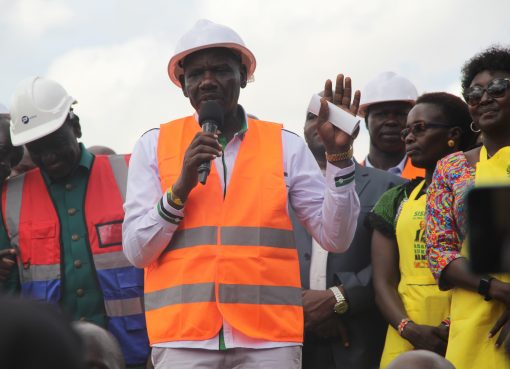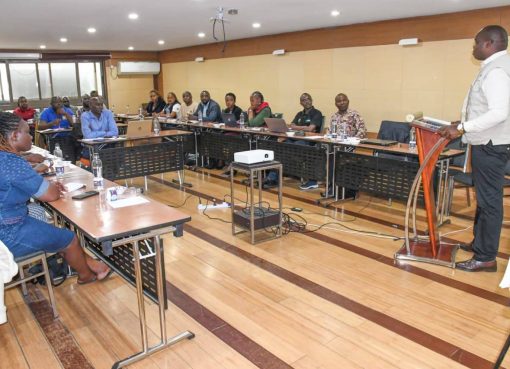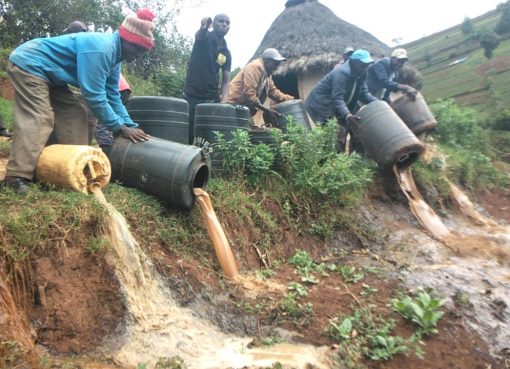The government is currently distributing approximately 7.5 million 50 kg bags of fertilizer annually.
Despite progress in increasing fertilizer use to 55 kg per hectare of nutrients, surpassing the Sub-Saharan average of 17Kg per hectare, the country is still experiencing degraded soils.
State Department of Agriculture Principal Secretary (PS) Dr. Kipronoh Ronoh said on Tuesday that the country has witnessed stagnation in maize productivity at 15 to 18 of a 90kg bag/acre compared to a potential of 52 bags per acre.
Speaking on Tuesday when he officially opened Data for Soil Health and Scale Summit in Nairobi, the PS explained that this stagnation is partly attributed to the soil’s inability to supply nutrients to support plant growth due to soil acidity and lack of corrective liming suppressing yields in many parts of the country.
In addition, Dr. Ronoh said that smallholder farmers use primarily Nitrogen and Phosphorus (NP) fertilizer, yet deficiencies of other nutrients including potassium, sulphur, calcium, magnesium, zinc and boron, are constraining yields
“The country is struggling with issues of soil acidity, balanced nutrition, and organic carbon. It is estimated that acid soils in Kenya occupy about 13 percent of the total land area and 39 percent of Kenya’s arable land, which is 7 million acres, is strongly acidic”, he added.
He however, noted that the private sector has invested in fertilizer blending facilities, with the current annual blending capacity estimated at 1.2 million MT.
The current capacity utilization is between 17-20 percent, he said, adding that the government is in the process of realigning the subsidy program to facilitate private sector participation.
The PS added that they are in the process of undertaking soil analysis to generate soil data that will be available as a public good in the Kenya Soil Information System (KenSIS).”
“We have employed youth, and we are giving them equipment to go to the farms, meet the farmers, and try to test their soil. We have finished seven counties, and we intend to finish all 47 counties within the next six months,” he said.
The Government, Dr. Ronoh said, is promoting use of fertilizers that are crop specific, agro-ecological zone specific and those that are responding to soil nutrient requirements and has put in place measures to identify the requirement in every region in terms of nutrients level so that it can provide the necessary treatment in terms of fertilizers
Kenya, like any other nation within the African continent, has committed to tripling domestic production and distribution of certified quality organic and inorganic fertilizers by 2034 to improve access and affordability for smallholder farmers, the PS reiterated.
The two-day summit, which will look at the inclusion of the data and innovation challenges that seek to highlight possible solutions around integrating data from multiple sources, thus enabling a holistic understanding and management of soil health, is commendable and could not have come at a better time, Dr Ronoh said.
Bringing together soil data from multiple sources is commendable and we expect that contestants in these challenges will be able to demonstrate practical solutions in the use of data and enhance efficiency in fertilizers application by farmers and decision-making by actors within the fertilizer value chain.
This summit, the PS said, is looking at the inclusion of the data and innovation challenge that seeks to highlight possible solutions around integrating data from multiple sources, thus enabling a holistic understanding and management of soil health that is commendable.
He noted that there are various and different data sets in silos, and therefore the meeting will come up with one agreed document from the experts, the innovators, the government, the policymakers, the donor community, and the private sector that will be a blueprint in terms of data for our soil.
Governor Nyeri County and representing the Council of Governors, Mutahi Kahiga, said in Nyeri they have done in excess of 3000 soil tests and found the soil very acidic.
We have spent close to around Ksh 100 million to introduce lime to the soil to try and reduce the acidity, and we have seen improvement,” he said, adding that they have introduced to farmers a test kit that costs Ksh 100 shillings to test the soil,” he added.
Global Lead Digital Agriculture, Data, and Innovation at the World Bank, Parmesh Shah, said with over 1.5 million farmers accessing digital farming and 75 percent of soil depleted, data is key.
“There are 16 sources of data on soil, but they are scattered everywhere with some piecemeal solutions. The data that has been brought to one platform in this summit to come up with one data,” he added.
From this process, hopefully, by the time we end up, we will have created a soil data innovation platform in Kenya and in the region.” Shah said
Last year Nairobi hosted an African Soil and Fertilizer Health Summit and came out with ten action plans on how best Africa can move forward to really address matters to do with soil ecosystems.
By Wangari Ndirangu





